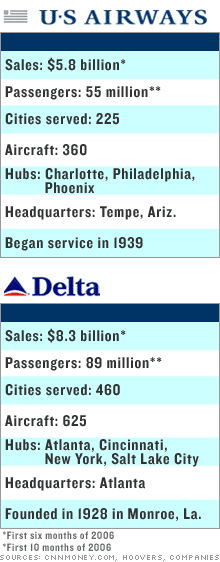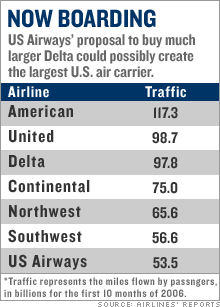US Air makes $8 billion bid for DeltaNo. 7 carrier's unsolicited bid for bankrupt No. 3 Delta could spark other deals in the troubled industry.NEW YORK (CNNMoney.com) -- US Airways Wednesday made a surprise $8 billion offer to buy its bigger rival Delta Air Lines, a bid that could spark a round of mergers leaving the United States with just a handful of major airlines. The deal, if completed, would combine two of the oldest and most storied airlines in the United States. Delta started as a crop duster in the 1920s and grew to make its base at Atlanta-Hartsfield the nation's largest airport. US Air started as a mail carrier in the 1930s and has gone through several mergers and two bankruptcies.
The current US Air, the nation's No. 7 carrier, is proposing to buy No. 3 Delta for about $4 billion in cash and 78.5 million shares of US Airways stock, also worth $4 billion based on Tuesday's closing price. US Air has proposed keeping the Delta name if the merger is completed. Delta's management did not endorse the deal, saying the carrier plans to remain independent. More mergers could eventually lead to fewer flights, fewer empty seats and perhaps higher fares for the remaining carriers - a trend already underway in the industry. But US Air said Wednesday that a merger with Delta, which is operating in bankruptcy, could lead to lower fares at the merged airline. It said it could complete the deal in the first half of 2007, and that the merger would need to occur while Delta was still in bankruptcy. "Consumers will have more choice and more reach, and a carrier that has a cost structure of a low-fare carrier," US Air CEO Doug Parker said in a phone interview with CNN and CNNMoney. But Parker admitted that some of the major hubs now served by the two airlines could see cuts as the networks are combined. "It's unclear at this point ... how much each hub would have in terms of service," he said. "We'll have a series of complementary hubs that make sense." He said the Charlotte, N.C., hub of US Air would remain, as would Delta's Salt Lake City hub, despite their relative proximity to Delta's hub in Atlanta and the Phoenix hub of US Air, respectively. Completing a deal could prove complicated. In addition to the cool reception from Delta management and the needed approval from regulators, a merger would need the OK from the bankruptcy court overseeing Delta's operations. The last airline deal of this magnitude, United Airline's proposed purchase of US Airways, was blocked by the Justice Department on antitrust grounds in 2001, just before the Sept. 11 terrorist attack. Antitrust attorney Alan Silberman, with Sonnenschein Nath & Rosenthal, said that given the growth of low-fare carriers in the airline industry the last five years, approval of the proposed deal by the Justice Department is likely. "It's hard to see (antitrust issues) in today's airline industry," he said. "There are nimble smaller carriers that, assuming they can get access to gates, will be in the position to exercise positive price effect on the market." Still, airline consultant Michael Boyd said fares, particularly in smaller markets, would be bound to rise if there is a deal between US Air and Delta. "We're at 80 percent of capacity, which means everything is full," he said. "You take out more capacity, have fares to go up. "In some cities, like Montgomery, Ala, they would control 75 percent of the market. Norfolk, Va. now has seven Delta flights to Atlanta, and seven US Air flights to Charlotte. You think the combined entity will continue to fly 14 flights out there?" While the nation's airlines have been slowly returning to profitability this year with fuller planes and higher fares, some officials say there are still too many planes in the air, making it difficult for carriers to fly profitably. On Wall Street, US Air (up $6.64 to $57.57, Charts) investors welcomed the proposal, sending the carrier's stock soaring more 12 percent in midday New York Stock Exchange trading. Shares of the thinly-traded Delta (Charts) jumped 19 percent at the open but then retreated to a more modest gain. Those shares are likely to be worthless with Delta's emergence from bankruptcy. Delta not on board Delta is apparently not in favor of any deal, although CEO Gerald Grinstein said the company would review the US Air offer. "Delta's plan has always been to emerge from bankruptcy in the first half of 2007 as a strong, stand-alone carrier," he said in a statement. "Our plan is working and we are proud of the progress." Parker, who as head of the former America West completed a purchase of US Airways just over a year ago, said Wednesday he's confident that he'll be able to convince Delta management and its creditors of the value of the deal. "What you're hearing right now is reaction from people who haven't yet been able to digest the offer," he said. With Delta shareholders likely to emerge from the bankruptcy process with little or no equity in the company, a hostile bid from US Air would be different from a typical corporate takeover battle. The bankruptcy court has given Delta management until Feb. 15 to be the only one to present a reorganization plan to the court. But Delta does not expect to be out of bankruptcy court until the middle of next year, so unless it has that exclusivity period extended again, the court could decide after Feb. 15 that US Air's proposal is better for the company and its creditors, approving the deal over management objections. It's also not clear if US Air will be the only bidder for Delta. When questioned, Delta spokeswoman Betsy Talton confirmed that US Air's offer is not the first that Delta has received. "Yes, Delta has been approached, but as always we are confident that we will emerge as a stand-alone company," she said. Airline analyst Ray Neidl of Calyon Securities said there's a good chance the deal will take place, although he said it could be tripped up by regulators citing antitrust rules or by a competing bid from another major airline. "I believe United has the financial wherewithal to be a bidder, and American said they would not be left out of the industry consolidation," said Neidl, who said he expects the six major carriers with hub-and-spoke networks to shrink to just three in the next two years. "The industry only really needs about three full-service network carriers," he said. "That could happen. We've got too many airlines and too many hubs." Parker also said the industry still has too much capacity to allow airlines to make the profits they need in good economic times. Atlanta-based Delta ranks behind No. 1 American Airlines, owned by AMR Corp (Charts)., and United Airlines (Charts), which is No. 2 in terms of miles flown by paying passengers. US Air, which started as a mail carrier in the Midwest in 1939, has experience with mergers while in bankruptcy. It was bought by America West in September 2005 during its second trip through the bankruptcy court process. That deal closed shortly after a downturn in fares and high fuel prices sent both Delta and Northwest Airlines (Charts) into bankruptcy on the same day. US Air stock has soared nearly 150 percent since that merger. US Air is much smaller than Delta, with only about half the passenger traffic, and ranks behind low-cost Southwest Airlines (Charts), the nation's most profitable carrier. Delta and US Airways together would be larger than American, but if there is a merger, the combined company would have to sell some of its operations to win approval from regulators. For example, the airlines are the only two competitors on the lucrative New York-Washington shuttle - one of which would have to be sold. Parker said the new Delta would have about 10 percent less capacity than the two airlines do as separate carriers. He said the savings from the combination will allow the deal to add to US Airway's earnings per share in the first year after the deal closes. He also said that the projected $1.7 billion in annual cost savings from a deal can be accomplished without any layoffs of line employees such as pilots, flight attendants or mechanics, or further pay cuts by employees. Any staffing reductions due to reduced flights can be accomplished through normal attrition and retirements, he said. In fact he projects that labor costs at the combined airline would rise $90 million a year over the current labor costs at the two separate carriers, as employees would receive the higher of the two pay scales now in effect at Delta or US Air. Such a proposal is designed to reduce employee opposition, which has caused problems in some earlier airline mergers. Boyd who is critical of the deal said that combining the airlines will still be difficult, especially considering that the former America West and US Air are not yet fully integrated. "Those (America West and US Air) were not overlapping airlines. America West got its hands on an East Coast cadaver. That's very different from combining two overlapping airlines." |
|


